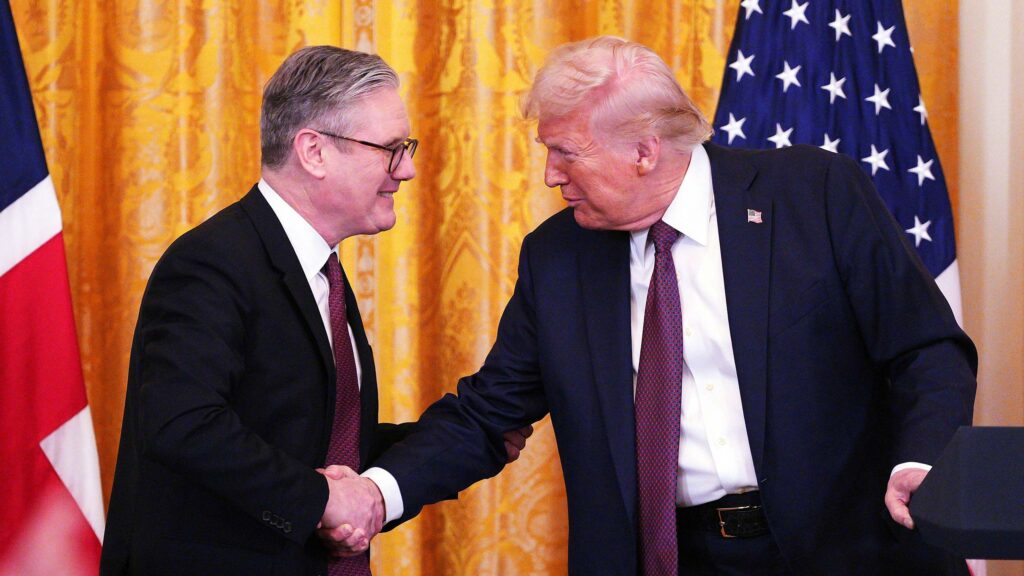Labour accused of bypassing parliament to embed US trade deal
 Keir Starmer (left) and US president Donald Trump in February © Carl Court/Pool Photo via AP/Alamy Stock Photo
Keir Starmer (left) and US president Donald Trump in February © Carl Court/Pool Photo via AP/Alamy Stock Photo Sir Keir Starmer’s Labour government is facing sharp criticism from farmers and opposition MPs for fast-tracking key parts of the UK-US Economic Prosperity Deal without full parliamentary scrutiny.
Using statutory instruments (SIs), the government has granted large volumes of US agricultural imports tariff-free access before MPs have been given the opportunity in parliament to scrutinise and vote, sparking concerns about transparency and standards.
At the heart of the controversy is SI 2025/753, which introduces tariff-free quotas for 13,000t of US beef and 1.4bn litres of ethanol.
See also: Fears Ensus may follow Vivergo into shutdown
Passed under the “negative procedure”, this statutory instrument automatically becomes law unless actively opposed, effectively bypassing the usual process of detailed parliamentary debate and vote.
Despite government assurances that MPs will have the opportunity to scrutinise the deal once it is formally presented to parliament, legal experts and campaigners argue that this reverses the normal order of treaty approval – but say it would be very difficult and disruptive to reverse.
“Ministers are using SI 2025/753 under the negative procedure to hard-wire US market-access concessions into UK law before any treaty has been laid under the Constitutional Reform and Governance Act, or put to a vote,” said Liz Webster, founder of Save British Farming.
“That is the opposite of normal treaty practice.”
Alongside SI 2025/753, three companion statutory instruments form what campaigners describe as a “deregulatory chassis” aimed at enabling the US deal, while weakening the UK’s high food and farming standards.
These include SI 2025/776, which weakens poultry welfare laws by legalising the lifting of birds under 5kg by their legs – a rollback now subject to judicial review by the Animal Law Foundation – and SI 2025/361, which removes reauthorisation and reporting requirements for genetically modified organisms (GMOs) and feed additives, weakening food safety oversight.
In addition, SI 2025/18 extends grace periods on import checks for organic produce, fruit and vegetables, delaying full implementation of labelling and certification rules.
The government describes these changes as “technical” or “streamlining” measures. However, legal scholars warn of serious implications – not just for UK standards but also for Northern Ireland’s regulatory compliance with the Windsor Framework and the UK’s obligations under the EU-UK Trade and Co-operation Agreement (TCA).
Constitutional experts including Professor Paul Craig of Oxford University and Andrew Duff of Cambridge University argue that embedding treaty terms into domestic law before formal parliamentary approval breaches TCA Article 524 and Windsor Framework Article 2, which require rule-of-law safeguards and proper governance.
Ms Webster added: “For farmers, the risk is immediate: quotas and weakened controls invite cheaper imports while impending changes to inheritance tax will force land sales at home.
“Northern Ireland then wears the fallout because divergence from EU sanitary and phytosanitary baselines undermines the Windsor Framework.”
Opposition MPs are demanding urgent accountability.
Tim Farron, the Liberal Democrat agriculture spokesman, said: “It is deeply alarming that these significant changes are being nodded through without any parliamentary scrutiny. This cannot be allowed to happen.
“MPs must be given the final say to defend our food, farming and animal welfare standards.”
It is understood that Mr Farron will raise this issue as part of an urgent question in parliament on Monday, 1 September.
Farmers Weekly asked the Department for Trade for a comment, but the enquiry was passed to Defra, which responded on behalf of the government.
It defended the approach, saying that “all these statutory instruments are laid before parliament following the usual procedures” and that MPs “will have the opportunity to scrutinise the UK-US trade deal when it is formally presented to the house”.
A spokesman also highlighted a record £11.8bn farming support package this parliament as proof of the government’s “steadfast commitment to food security”.
“Thanks to our trade deal with the US, UK beef farmers now have exclusive access to the world’s largest consumer market for the first time,” the spokesman added.
But campaigners remain unconvinced. Ms Webster warned: “Don’t tell us ‘nothing has changed’ while you legislate the trade concessions first and ask parliament to look later.
“This flips the normal order of treaty scrutiny and shifts our standards by stealth. It’s also curious that the Department for Business and Trade passed its principle responsibilities to Defra for comment.”
What the SIs do in practice
SI 2025/753 Customs (Preferential Trade Arrangements and Tariff Quotas) (US) (Amendment) Regulations 2025
- Grants tariff-free access to 13,000t of US beef and 1.4bn litres of ethanol
- Passed by negative procedure – automatically becomes law unless opposed
- Locks in market access concessions before any treaty is debated
SI 2025/776 Welfare of Animals (Transport) (Amendment) Regulations 2025
- Weakens poultry welfare standards
- Legalises lifting chickens and turkeys under 5kg by their legs (banned under EU law)
- Now subject to a judicial review by the Animal Law Foundation
SI 2025/361 Food and Feed (Regulated Products) (Amendment, Revocation, Consequential and Transitional Provision) Regulations 2025
- Removes reauthorisation and reporting requirements for GMOs and feed additives
- Critics warn this reduces food safety oversight
SI 2025/18 Common Organisation of the Markets in Agricultural Products (Marketing Standards and Organic Products) (Transitional Provisions) (Amendment) Regulations 2025
- Extends grace periods on checks for organic fruit and vegetables
- Delays labelling and certification rule
